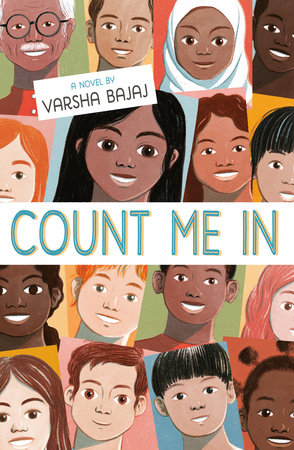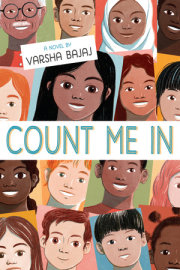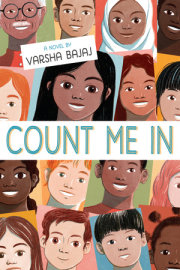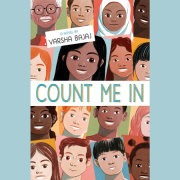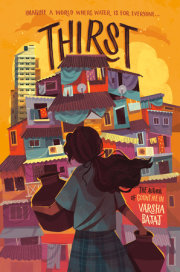Chapter 1: Karina Chris Daniels and I are like separate planets orbiting in the same galaxy.
Like the planets, we have our own paths, and I like it that way. Mine is full of photos and stories, and his is full of basketball and hyenas.
Like Venus and Earth, we are next-door neighbors. We’ve been in the same school since I moved to the neighborhood in third grade, but we’ve been in the same class only once—in fifth grade.
Then, of all the crappy karma, there he is, on the first day of seventh grade, in five out of my seven classes at Spring Hill Middle School.
How did this happen—and why?
I must’ve had some good karma too, because Ms. Trotter is my homeroom and social studies teacher. She is the best. She greets me with a fist bump. For real.
Ms. Trotter is flawed, though. She believes in assigned seating. Seeing Chris sitting at the desk on my left in homeroom makes it impossible to focus. Our paths are getting dangerously close.
It makes me remember stuff from a year ago that I’d buried away, like those jeans with patchwork flowers in the depths of my closet.
Being neighbors, Chris and I have waited at the same bus stop every morning for years. He always carries some type of ball: basketball, football, or baseball. The boys play an impromptu game, as if they can’t waste even those few minutes before the bus rumbles in. I typically have my nose in a book, because I have a genetic flaw that does not allow me to catch, throw, or whack a round object. Also, I don’t want to be laughed at. When a girl named Emily played with the boys and flubbed a catch, they laughed all the way to school and back—for days.
It feels like survival of the most athletic on our suburban Houston streets.
And Chris was a witness to one of the worst moments in my middle-school life . . .
***
It was in sixth grade, early in the school year. It was still ninety-eight degrees, because apparently the weather gods had not flipped the calendar from summer to fall yet.
Every ride home on the bus was a sauna, and it brought out the worst in the boys, who for some reason had turned into a pack of cackling hyenas that year.
While the rest of us fanned ourselves with notebooks or sighed in submission to the heat, they started making lists, and they were not harmless to-do lists.
The prettiest girls.
The bossiest girls.
The girls with the best hair. (My best friend, Ashley, made that list.)
The girls with the worst hair.
Your basic degrading grading system for girl human beings. Then Quinn, or Hyena 1, said, “Let’s make a list of the girls with the hairiest arms.”
Because why not, right?
Instinctively, I pulled at my short sleeves. I didn’t have a sweater or cover-up, because: ninety-eight degrees.
Together, the hyenas said, “K Chops!”
Yuck! Yuck! Yuckity yuck!
Yes, I, Karina Chopra, was at the top of the list. The only one on the list. The boys thought it was so hilarious that they couldn’t stop laughing long enough to name anyone else.
I glanced around through lowered lids. Some of the kids nearby pretended they had not heard, but I knew they had, because they weren’t wearing earplugs, and none of them had a hearing problem.
Others were laughing.
For the briefest moment in time, like a nanosecond, I caught Chris Daniels’s eye. He wiped off his grin the moment our eyes met, then looked away, because he had been seen.
Back then, I envied girls who had older brothers or sisters to protect them from bullies. Before the hairy-arms incident, I imagined that my neighbor Chris, who had grown taller and bigger, would one day be my friend and stand up for me. His older brother, Matt, was always friendly to me, but he had gone off to college a few years back.
After I saw Chris being a jerk with his friends, I realized he was not Superman. And I didn’t need rescuing, anyway.
The rest of the way home, I was mad at myself for caring. Ashley, who usually sat with me on the bus, was home sick that day. If she had been there, she would have glared at the hyenas and said, “Karina, they’re fools.” But in a way, I was just as glad she missed it all. Who needs a witness to humiliation?
From that day forward, I wore a lot of long-sleeved shirts to cover up my arms, even in the heat of Houston, Texas.
At first, Mom didn’t notice. She and Dad were busy building their sandwich franchise. Mom had quit her nine-to-five job at an oil company a year before. Dad still had his day job as a computer systems analyst, which meant he was working twenty-five out of twenty-four hours.
Finally, one day Mom looked at me and said, “Karina, what happened to all the cute shirts that we bought for back-to-school?”
She had caught me off guard, so I blurted out the truth. “They all have short sleeves, and I need to cover up my ugly arms.”
Mom and Dad exchanged one of their looks. “Oh, Karina,” Mom said. “Boys can be awful. Don’t let them get to you. Your arms are not ugly.”
But a mother has to say that, right?
Around that same time, I was passed a note. It had my name on it in big, bold letters—
KARINA.
I turned to see who had written to me, but everybody had their heads down.
I opened the note. The same bold letters spelled
CURRY CHOPS STINKS. GO HOME. When I looked back again, Hyena 1, otherwise named Quinn, was giggling.
I read the note again. This time, I took a deep breath to calm myself.
I didn’t live under a rock. I knew that since 9/11, when the Twin Towers tumbled and terror came to our shores, people have looked at brown skin with suspicion. I wasn’t even born then, but the stories were whispered in South Asian immigrant homes for years after. Usually, the adults tried to shield us kids. Even so, the fear seeped through closed doors and ventilation ducts.
Be careful, they said. Be careful.
When I was seven or eight, my older cousin told me about the Sikh American man who got shot in Arizona after the 9/11 attacks, probably because he was wearing a turban—and that alone made the murderer think, Foreigner, terrorist. My cousin had been telling us ghost stories. Somehow, she ended up telling us a real story that was even scarier.
I was thankful that my father and grandfather did not wear turbans, and I worried for my friends whose fathers and grandfathers did.
My parents calmed my fears; they believed in America and said we were still safe. I trusted them, because I wanted to.
It could never happen to me, I told myself. And why would it happen to me? I was like my friends and peers.
I reread the note:
CURRY CHOPS STINKS. GO HOME. Was I different from my friends and peers?
I knew I didn’t stink. The note was Quinn’s way of saying he thought I was un-American, even though I was born in Texas and so were my parents.
I remember crumpling the note very deliberately and tossing it into the trash when the teacher wasn’t looking. And for once, despite my shaky hands, it fell into the basket in one determined arc, because that was where it belonged and the universe knew that. I noticed Chris Daniels watching me make that throw.
When I told my dad about the note, he let out a swear word, and I could see how upset he was. “Ignore the haters, Karina,” he told me. “Keep your head down and work. My father always said that the best revenge is success. And remember, this is your country as much as it is Quinn’s.”
***
Ms. Trotter asks me a question and brings me to back to class. She looks confused when I have no answer. She does not realize that I have not heard a word she said.
Chris and I don’t speak to each other the rest of that first day of seventh grade. Nor do we on the bus ride home.
Today, I’d let myself be distracted by Chris Daniels.
But tomorrow will be different. I am determined to have a good year and to do well, especially in math. Two things are definitely going to help me with that. My grandfather is moving in with us, and he is a math whiz—I will have my own personal tutor at home.
Papa coming to live with us is also great because it means I won’t have to go to the sandwich store after school. I’ll get a break from slicing cucumbers and tomatoes, and I’ll have more time for my photography.
In the evening, I borrow Dad’s Canon and stroll around the neighborhood, taking pictures. I need to submit my best photograph for an art gallery competition, later this fall, and I’m still shooting.
I can already see my photograph hanging on the gallery’s perfect walls, bathed by a spotlight. I can hear the applause. I can smell the wine and cheese. Will they have sparkling cider for the underage exhibitors?
Yes, it is going to be a very good year.
Chapter 2: Chris Awkward.
Karina Chopra is in five out of my seven classes this year.
She and I haven’t exchanged a word in like a year or something. Daniels, I tell myself, she thinks you’re one of the mean dudes. I hate that.
Ms. Trotter is all over her. “It’s so good to have you in my class,” she tells Karina, beaming.
Karina is all smiles. Like nobody has told that girl the basic rule of social survival. Be cool when an adult, especially a teacher, gushes over you. Instead, Karina is all giggly, and then they fist-bump. Like they’re besties!
But Karina doesn’t seem to care what people think. She’s got her nose in a book at the bus stop every morning. And every couple of days, she has a new book.
I’d like to say something to her, to be able to tease her in a good way, but the memory of stuff that happened at the beginning of middle school stops me.
***
That day, on the bus, the guys started making lists. Dumb lists. The prettiest girls, the bossiest, etc. Those lists are not my thing. I never say much when the guys do stuff I don’t think is funny.
Then Quinn had the bright idea of making a list of the girls with the hairiest arms.
I groaned. Nothing good would come out of this, I knew.
“K Chops is the queen of hairy arms,” he declared, and then he yukked it up as if it was the funniest thing ever.
I looked across the aisle right when Karina was looking my way. She gave me a look that said, I feel sorry for you. After that, she kept a poker face, opened her backpack, took out her book, and read the whole way home.
I wish I had said something. If only I knew Karina better and could explain things. I wish I had told her that with her brown eyes and big smile, she should have been on the list of prettiest girls.
That evening, I called my brother, Matt, who was away at college.
I told him about how cool it was to be on the basketball team and how I’d scored. And then I told him about the bus and Karina, because it had bothered me all day and Matt is the best listener in the whole world.
Matt groaned. “That’s ugly, dude.”
I could also count on him to understand.
Ugly was correct.
“What’d you do?” he asked.
What could I have done? I had asked myself that question. I was sitting on the bus with the guys from the basketball team, and I had only waited forever to be able to sit with them—to be one of the guys. If I had said something at the time, what price would I have had to pay?
The middle-school bus is a monster that no one has slayed, as far as I know. Being quiet—biting your tongue, swallowing your thoughts and words—is how you survive. So far, those tactics have worked for me.
“Doing the right thing is hard,” he said when I was silent. “But, Chris, at least you know what is right and wrong.”
I did know the difference, but was that enough? Did I need a new game plan?
“I’ll be home in a few weeks, Chris. Hang in there, okay? We’ll shoot hoops together and talk.”
Since that day, Karina hasn’t talked to me.
To make things even worse, around that same time, Quinn passed Karina a nasty note. I remember watching her face crumple when she opened it. Then she tossed it in the trash when Mrs. Clay wasn’t looking.
All through that class, I kept thinking about the note. What could Quinn have said? There was no way for me to concentrate on word problems with fractions. At the end of the class, after everyone left, I dug through the garbage and found the tightly balled note. I smoothed the paper and read it.
CURRY CHOPS STINKS. GO HOME. At first, I didn’t even understand it. Quinn wanted Karina to go home in the middle of the day? Why did he call her Curry? And she didn’t stink.
Then it sunk in how he was insulting her.
I called good old Matt again. What would I do without him? I felt bad for anyone who didn’t have Matt as a big brother. When I told him what happened, Matt was silent for the longest time.
“You there?” I asked.
“Quinn is a small-minded squirt,” he said.
The next day, I was already feeling pretty angry toward Quinn when we were put on opposing teams during a basketball game in PE. Each time Quinn ran toward the basket to score, I was a defensive wall and he couldn’t score at all. He got angry and crashed into me, making me fall.
“Trash play,” I yelled at him. “What’s your problem anyway, dude?”
Quinn gave me a funny look, but I didn’t care. I was mad—about a lot of things.
Why was it so hard to do the right thing?
***
Now, on the first day of seventh grade, I remember that moment. I wish that Karina had been there at that basketball game when I told Quinn off. Too bad girls have separate PE. Could I maybe reach across the aisle and tell her that? A year after the fact? Nah! She’d think I’d lost my marbles.
Copyright © 2019 by Varsha Bajaj. All rights reserved. No part of this excerpt may be reproduced or reprinted without permission in writing from the publisher.

